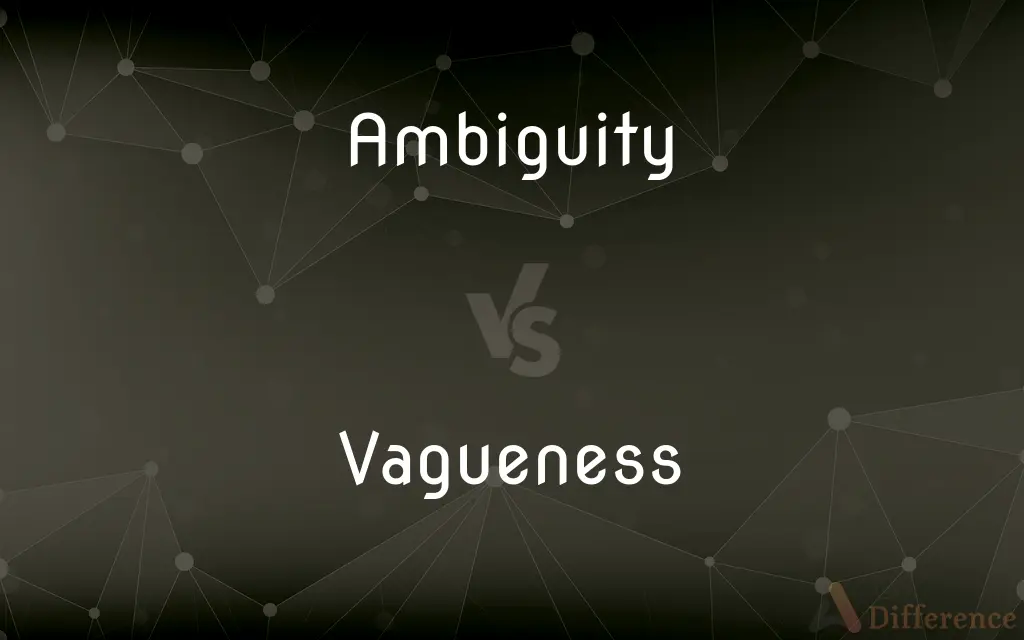Ambiguity vs. Vagueness — What's the Difference?
By Fiza Rafique & Maham Liaqat — Updated on March 10, 2024
Ambiguity and vagueness both obscure clarity, but ambiguity arises from multiple interpretations of the same expression, whereas vagueness stems from imprecise or unclear language.

Difference Between Ambiguity and Vagueness
Table of Contents
ADVERTISEMENT
Key Differences
Ambiguity is a feature of language that allows for multiple interpretations of the same expression, often due to the structure or context in which it is used. For example, the word "bank" can refer to a financial institution or the side of a river, depending on the context. Vagueness, on the other hand, occurs when language is imprecise or lacks specificity, making the intended meaning unclear. For instance, the phrase "some people" is vague because it does not specify which people are being referred to.
Ambiguity can lead to misunderstandings if the intended interpretation is not clear from the surrounding information. Vagueness can lead to confusion because it leaves too much to the imagination, requiring the listener or reader to infer the intended meaning from an insufficient amount of information.
While ambiguity can be resolved by clarifying the context or by additional information that pinpoints the intended meaning, vagueness often requires more specific language or definitions to clear up the uncertainty. In literature and poetry, ambiguity might be used deliberately to enrich the text with multiple layers of meaning, whereas vagueness is generally avoided in precise communication because it can hinder understanding.
Ambiguity and vagueness are not mutually exclusive and can coexist in the same statement. A sentence can be ambiguous if it has multiple specific interpretations and vague if those interpretations are themselves imprecise. Recognizing and addressing both ambiguity and vagueness is crucial in achieving clear and effective communication.
Comparison Chart
Definition
Multiple specific interpretations possible
Lack of specificity or precision
ADVERTISEMENT
Cause
Structure, context, or polysemy
Imprecise language, lack of detail
Resolution
Clarifying context or additional information
More specific language or definitions
Use in Literature
Often deliberate for richness
Generally avoided
Coexistence
Can coexist in a statement
Can be present alongside ambiguity
Compare with Definitions
Ambiguity
The quality of being open to more than one interpretation.
The ambiguity of the poem allows for diverse analyses.
Vagueness
Lacking clear or precise detail.
His directions were so vague that we got lost.
Ambiguity
A word or expression that can be understood in more than one way.
The word bat is an ambiguity that could mean an animal or a sports equipment.
Vagueness
Not clearly expressed or easily understood.
Her vague response left everyone confused.
Ambiguity
A statement or situation that has potentially conflicting interpretations.
The plot's ambiguity kept the readers guessing until the end.
Vagueness
Characterized by a lack of specificity.
Vague descriptions can lead to multiple interpretations.
Ambiguity
Linguistic uncertainty due to multiple interpretations.
Legal documents avoid ambiguity to prevent misunderstandings.
Vagueness
Indefinite or unclear in meaning or character.
The vague terms of the agreement made it open to interpretation.
Ambiguity
An unclear or inexact aspect due to multiple meanings.
The ambiguity in her statement made it difficult to choose a side.
Vagueness
A statement or concept with unclear boundaries.
The concept of happiness is often vague and subjective.
Ambiguity
Ambiguity is a type of meaning in which a phrase, statement or resolution is not explicitly defined, making several interpretations plausible. A common aspect of ambiguity is uncertainty.
Vagueness
In linguistics and philosophy, a vague predicate is one which gives rise to borderline cases. For example, the English adjective "tall" is vague since it is not clearly true or false for someone of middling height.
Ambiguity
Doubtfulness or uncertainty as regards interpretation
"leading a life of alleged moral ambiguity" (Anatole Broyard).
Vagueness
Not clear in meaning or expression; inexplicit.
Ambiguity
Something of doubtful meaning
A poem full of ambiguities.
Vagueness
Not thinking or expressing oneself clearly
"Most of us are quite vague about the theoretical underpinnings of the medical theories that guide our doctors" (Kwame Anthony Appiah).
Ambiguity
(countable) words or statements that are open to more than one interpretation, explanation or meaning, especially if that meaning cannot be determined from its context.
His speech was made with such great ambiguity that neither supporter nor opponent could be certain of his true position.
Vagueness
Lacking definite shape, form, or character; indistinct
Saw a vague outline of a building through the fog.
Ambiguity
(uncountable) The state of being ambiguous.
Vagueness
Indistinctly felt, perceived, understood, or recalled; hazy
A vague uneasiness.
Ambiguity
The quality or state of being ambiguous; doubtfulness or uncertainty, particularly as to the signification of language, arising from its admitting of more than one meaning; an equivocal word or expression.
No shadow of ambiguity can rest upon the course to be pursued.
The words are of single signification, without any ambiguity.
Vagueness
(uncountable) The condition of being unclear; vague.
Ambiguity
An expression whose meaning cannot be determined from its context
Vagueness
(countable) Something which is vague, or an instance or example of vagueness.
Ambiguity
Unclearness by virtue of having more than one meaning
Vagueness
The quality or state of being vague.
Vagueness
Unclearness by virtue of being vague
Common Curiosities
What causes ambiguity?
Ambiguity arises from the structure, context, or polysemy (multiple meanings) of language.
Can a statement be both ambiguous and vague?
Yes, a statement can have multiple interpretations (ambiguous) that are themselves imprecise (vague).
Why is vagueness problematic in communication?
It hinders understanding by not providing enough information for clear interpretation.
How is vagueness resolved?
By providing more specific language or detailed definitions.
Is it possible to eliminate all vagueness and ambiguity in language?
Completely eliminating them is challenging due to the inherent complexities and nuances of language.
Can ambiguity be deliberate?
Yes, writers often use ambiguity deliberately to add depth or multiple layers of meaning.
How does context affect ambiguity and vagueness?
Context can help resolve ambiguity by indicating the intended interpretation, but it may not always clarify vagueness.
Do different languages experience ambiguity and vagueness differently?
Yes, linguistic structure and cultural context can affect how and to what extent these phenomena occur.
How do legal documents handle ambiguity and vagueness?
They strive to minimize both through precise language and clear definitions to avoid interpretative disputes.
Is ambiguity always undesirable?
Not necessarily; in creative writing, ambiguity can enrich the text, but in precise communication, it's usually avoided.
What's a common example of ambiguity?
The sentence "I saw the man with a telescope" can mean either using a telescope to see the man or seeing a man who has a telescope.
Are there fields where vagueness is beneficial?
In some artistic or philosophical contexts, vagueness can stimulate thought or interpretation, but it's generally less desirable in clear communication.
Can ambiguity and vagueness be measured?
While subjective, clarity and specificity guidelines help assess and reduce both in communication.
Can technical jargon be vague?
Yes, if it lacks context or explanation, making it unclear to non-experts.
How do ambiguity and vagueness affect machine understanding of language?
They pose significant challenges for natural language processing, requiring sophisticated algorithms to interpret multiple meanings and contexts.
Share Your Discovery

Previous Comparison
Marketplace vs. Market
Next Comparison
Orthodox vs. EvangelicalAuthor Spotlight
Written by
Fiza RafiqueFiza Rafique is a skilled content writer at AskDifference.com, where she meticulously refines and enhances written pieces. Drawing from her vast editorial expertise, Fiza ensures clarity, accuracy, and precision in every article. Passionate about language, she continually seeks to elevate the quality of content for readers worldwide.
Co-written by
Maham Liaqat















































